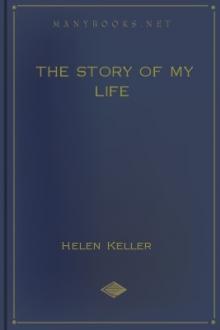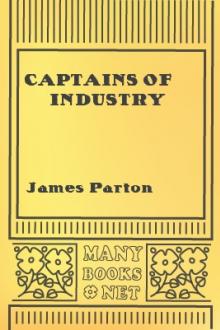The Story of My Life by Helen Keller (good books to read for beginners .txt) 📕

- Author: Helen Keller
- Performer: 0140439153
Book online «The Story of My Life by Helen Keller (good books to read for beginners .txt) 📕». Author Helen Keller
Thus far my summer has been sweeter than anything I can remember.
My mother, and sister and little brother have been here five weeks, and our happiness knows no bounds. Not only do we enjoy being together; but we also find our little home most delightful.
I do wish you could see the view of the beautiful lake from our piazza, the islands looking like little emerald peaks in the golden sunlight, and the canoes flitting here and there, like autumn leaves in the gentle breeze, and breathe in the peculiarly delicious fragrance of the woods, which comes like a murmur from an unknown clime. I cannot help wondering if it is the same fragrance that greeted the Norsemen long ago, when, according to tradition, they visited our shores—an odorous echo of many centuries of silent growth and decay in flower and tree….
TO MRS. SAMUEL RICHARD FULLER
Wrentham, October 20, 1899.
…I suppose it is time for me to tell you something about our plans for the winter. You know it has long been my ambition to go to Radcliffe, and receive a degree, as many other girls have done; but Dean Irwin of Radcliffe, has persuaded me to take a special course for the present. She said I had already shown the world that I could do the college work, by passing all my examinations successfully, in spite of many obstacles. She showed me how very foolish it would be for me to pursue a four years’
course of study at Radcliffe, simply to be like other girls, when I might better be cultivating whatever ability I had for writing.
She said she did not consider a degree of any real value, but thought it was much more desirable to do something original than to waste one’s energies only for a degree. Her arguments seemed so wise and practical, that I could not but yield. I found it hard, very hard, to give up the idea of going to college; it had been in my mind ever since I was a little girl; but there is no use doing a foolish thing, because one has wanted to do it a long time, is there?
But, while we were discussing plans for the winter, a suggestion which Dr. Hale had made long ago flashed across Teacher’s mind—that I might take courses somewhat like those offered at Radcliffe, under the instruction of the professors in these courses. Miss Irwin seemed to have no objection to this proposal, and kindly offered to see the professors and find out if they would give me lessons. If they will be so good as to teach me and if we have money enough to do as we have planned, my studies this year will be English, English Literature of the Elizabethan period, Latin and German….
TO MR. JOHN HITZ
138 Brattle St., Cambridge,
Nov. 11, 1899.
…As to the braille question, I cannot tell how deeply it distresses me to hear that my statement with regard to the examinations has been doubted. Ignorance seems to be at the bottom of all these contradictions. Why, you yourself seem to think that I taught you American braille, when you do not know a single letter in the system! I could not help laughing when you said you had been writing to me in American braille—and there you were writing your letter in English braille!
The facts about the braille examinations are as follows: How I passed my Entrance Examinations for Radcliffe College.
On the 29th and 30th of June, 1899, I took my examinations for Radcliffe College. The first day I had elementary Greek and advanced Latin, and the second day Geometry, Algebra and advanced Greek.
The college authorities would not permit Miss Sullivan to read the examination papers to me; so Mr. Eugene C. Vining, one of the instructors at the Perkins Institution for the Blind, was employed to copy the papers for me in braille. Mr. Vining was a perfect stranger to me, and could not communicate with me except by writing in braille. The Proctor also was a stranger, and did not attempt to communicate with me in any way; and, as they were both unfamiliar with my speech, they could not readily understand what I said to them.
However, the braille worked well enough in the languages; but when it came to Geometry and Algebra, it was different. I was sorely perplexed, and felt quite discouraged, and wasted much precious time, especially in Algebra. It is true that I am perfectly familiar with all literary braille—English, American, and New York Point; but the method of writing the various signs used in Geometry and Algebra in the three systems is very different, and two days before the examinations I knew only the English method. I had used it all through my school work, and never any other system.
In Geometry, my chief difficulty was, that I had always been accustomed to reading the propositions in Line Print, or having them spelled into my hand; and somehow, although the propositions were right before me, yet the braille confused me, and I could not fix in my mind clearly what I was reading. But, when I took up Algebra, I had a harder time still—I was terribly handicapped by my imperfect knowledge of the notation. The signs, which I had learned the day before, and which I thought I knew perfectly, confused me. Consequently my work was painfully slow, and I was obliged to read the examples over and over before I could form a clear idea what I was required to do. Indeed, I am not sure now that I read all the signs correctly, especially as I was much distressed, and found it very hard to keep my wits about me….
Now there is one more fact, which I wish to state very plainly, in regard to what Mr. Gilman wrote to you. I never received any direct instruction in the Gilman School. Miss Sullivan always sat beside me, and told me what the teachers said. I did teach Miss Hall, my teacher in Physics, how to write the American braille, but she never gave me any instruction by means of it, unless a few problems written for practice, which made me waste much precious time deciphering them, can be called instruction. Dear Frau Grote learned the manual alphabet, and used to teach me herself; but this was in private lessons, which were paid for by my friends. In the German class Miss Sullivan interpreted to me as well as she could what the teacher said.
Perhaps, if you would send a copy of this to the head of the Cambridge School, it might enlighten his mind on a few subjects, on which he seems to be in total darkness just now….
TO MISS MILDRED KELLER
138 Brattle Street, Cambridge,
November 26, 1899.
…At last we are settled for the winter, and our work is going smoothly. Mr. Keith comes every afternoon at four o’clock, and gives me a “friendly lift” over the rough stretches of road, over which every student must go. I am studying English history, English literature, French and Latin, and by and by I shall take up German and English composition—let us groan! You know, I detest grammar as much as you do; but I suppose I must go through it if I am to write, just as we had to get ducked in the lake hundreds of times before we could swim! In French Teacher is reading “Columba” to me. It is a delightful novel, full of piquant expressions and thrilling adventures, (don’t dare to blame me for using big words, since you do the same!) and, if you ever read it, I think you will enjoy it immensely. You are studying English history, aren’t you. O but it’s exceedingly interesting! I’m making quite a thorough study of the Elizabethan period—of the Reformation, and the Acts of Supremacy and Conformity, and the maritime discoveries, and all the big things, which the “deuce” seems to have invented to plague innocent youngsters like yourself!…
Now we have a swell winter outfit—coats, hats, gowns, flannels and all. We’ve just had four lovely dresses made by a French dressmaker. I have two, of which one has a black silk skirt, with a black lace net over it, and a waist of white poplin, with turquoise velvet and chiffon, and cream lace over a satin yoke.
The other is woollen, and of a very pretty green. The waist is trimmed with pink and green brocaded velvet, and white lace, I think, and has double reefers on the front, tucked and trimmed with velvet, and also a row of tiny white buttons. Teacher too has a silk dress. The skirt is black, while the waist is mostly yellow, trimmed with delicate lavender chiffon, and black velvet bows and lace. Her other dress is purple, trimmed with purple velvet, and the waist has a collar of cream lace. So you may imagine that we look quite like peacocks, only we’ve no trains….
A week ago yesterday there was [a] great football game between Harvard and Yale, and there was tremendous excitement here. We could hear the yells of the boys and the cheers of the lookers-on as plainly in our room as if we had been on the field. Colonel Roosevelt was there, on Harvard’s side; but bless you, he wore a white sweater, and no crimson that we know of! There were about twenty-five thousand people at the game, and, when we went out, the noise was so terrific, we nearly jumped out of our skins, thinking it was the din of war, and not of a football game that we heard. But, in spite of all their wild efforts, neither side was scored, and we all laughed and said, “Oh, well now the pot can’t call the kettle black!”…
TO MRS. LAURENCE HUTTON
559 Madison Avenue, New York,
January 2, 1900.
…We have been here a week now, and are going to stay with Miss Rhoades until Saturday. We are enjoying every moment of our visit, every one is so good to us. We have seen many of our old friends, and made some new ones. We dined with the Rogers last Friday, and oh, they were so kind to us! The thought of their gentle courtesy and genuine kindness brings a warm glow of joy and gratitude to my heart. I have seen Dr. Greer too. He has such a kind heart! I love him more than ever. We went to St.
Bartholomew’s Sunday, and I have not felt so much at home in a church since dear Bishop Brooks died. Dr. Greer read so slowly, that my teacher could tell me every word. His people must have wondered at his unusual deliberation. After the service he asked Mr. Warren, the organist to play for me. I stood in the middle of the church, where the vibrations from the great organ were strongest, and I felt the mighty waves of sound beat against me, as the great billows beat against a





Comments (0)